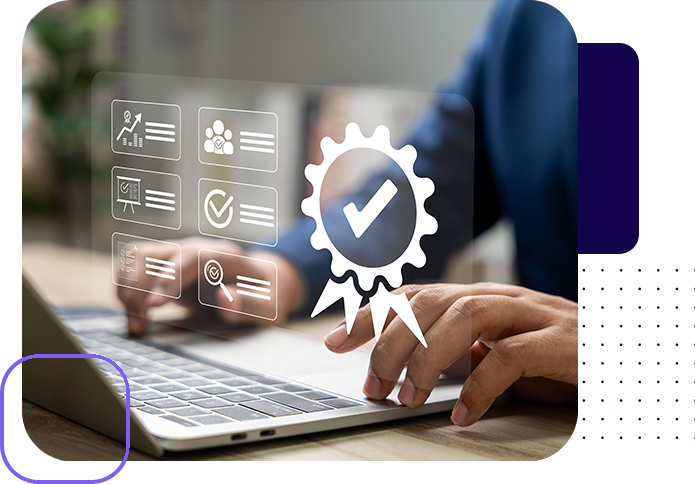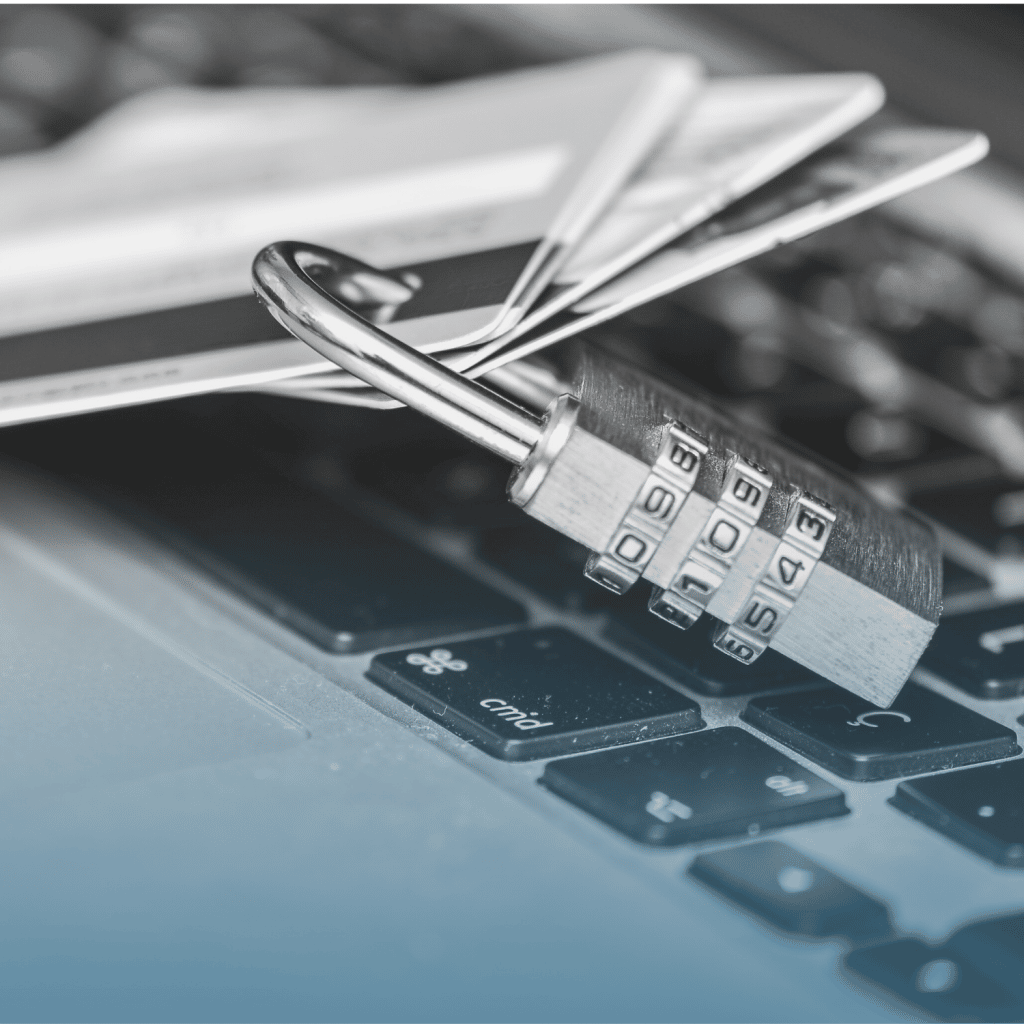Protect your business
Information Security Services
Data breaches, unauthorised access, and costly compliance failures can put your business reputation and bottom line at severe risk. Using expert information security services in the UK, you can safeguard data, minimise business risks, and ensure UK legal compliance.
Get fully protected today. We partner with UK cyber security compliance experts Bulletproof and Pentest People to deliver exceptional business protection from cyber threats. Enquire now for a tailored quote.

What is information security?
It’s the pratice of ensuring a sensitive details are kept safe to ensure they’re not disrupted, destroyed, or accessed without authorisation.
To do this, businesses need expert cyber security services. These are essential for all UK businesses, regardless of size or industry, for a positive global reputation. In a world where every business has a digital footprint, there is always a risk of data breaches, security threats and compliance failures.
By implementing the right measures, organisations can protect sensitive data, minimise risk, and stay on the right side of regulations. Our team offers expert-led, flexible solutions to support you every step of the way.



The difference between data protection and information security
Data protection vs information security is a key consideration for any business. Information security keeps all types of details safe from hackers, damage, or loss, whether it’s stored digitally or on paper. It helps protect against threats like hacking, damage or accidental loss using tools such as passwords, firewalls, and encryption to protect data.
Specialist data protection services focus on making sure personal details, like names, addresses, or phone numbers, are handled properly and legally. It’s guided by rules such as the UK GDPR to make sure people’s privacy is respected. These protective measures keep data safe and data protection makes sure it’s used in the right way.

Why business information security is crucial to success
From customer data and financial records to intellectual property and internal communications, a strong security strategy helps reduce risk, protect your business from cyber threats, and keep you in line with compliance standards like ISO 27001, SOC 2, and PCI DSS. And regardless of industry or business size, securing these details is essential to maintain trust, ensure operational continuity, and protect business value.
Whether you’re a small startup or a global enterprise, the consequences of a data breach can be devastating, leading to financial loss, legal penalties, and reputational damage.
With our innovative information security consultancy services we can offer a fully comprehensive package that helps target areas of risk, helping your organisation meet stringent data compliance standards, and enhances your data protection strategy. Our team of analysts and consultants will work closely with your brand to find pain points, areas of risk, and help you achieve necessary industry compliance and certifications.


Get protected with a suite of information security management services
Access strategic security leadership without the full-time cost.
Our Virtual Chief Information Security Officer (vCISO) service gives you direct access to experienced, high-level security specialists who understand your business and tailor your information security strategy to align with your goals. Whether you need support for compliance, risk management, or board-level reporting, your vCISO ensures security becomes a seamless part of your growth.
What’s included:
- Ongoing risk assessments and gap analysis
- Policy and process development
- Compliance support (e.g., ISO 27001, SOC 2, DORA)
- Security awareness training oversight
- Board-level reporting
Demonstrate trust and safeguard customer data with SOC 2.
If your business handles or stores customer data in the cloud, SOC 2 compliance is essential. Bulletproof helps you prepare for and pass SOC 2 audits with confidence, guiding you through the Trust Services Criteria and building the controls you need to prove your commitment to security and privacy.
What’s included:
- Gap assessments and readiness audits
- Control design and implementation
- Security monitoring and testing
- Ongoing compliance support
Secure payment data and meet industry standards with ease.
Compliance with the Payment Card Industry Data Security Standard (PCI DSS) is mandatory for any business that handles cardholder data. Our team of QSA-certified professionals provide end-to-end PCI support — from scoping and gap analysis to reporting and remediation — helping you avoid fines and build customer trust.
What’s included:
- PCI DSS scoping and gap analysis
- SAQ and ROC support
- Technical testing and remediation advice
- Ongoing compliance assistance
Prepare your business for the Digital Operational Resilience Act (DORA).
The DORA regulations are now in force as impact all financial entities operating in the EU. Our security and compliance experts can help you interpret DORA requirements, assess your operational resilience, and implement the necessary controls to ensure business continuity in the face of cyber threats.
What’s included:
- Regulatory gap analysis
- ICT risk management strategy
- Incident reporting process support
- Third-party risk assessments
Feature
Lite
Professional
Feature
Feature
Feature
Feature
The business benefits of information security consultancy services
Our partnership with two of the UK’s leading risk assessment specialist will strengthen your business’ long-term strategy. It’ll also help you achieve critical compliance standards. Our experts are accredited by a wide range of qualifications including CREST, CHECK, Cyber Essentials, ISO 27001, PCI DSS QSA, and ISO 9001.
Access end-to-end solutions, from business penetration testing and cyber attacks monitoring to compliance consultancy and managed information systems. All of this is tailored to protect how your business operates against evolving security risks.
With deep technical knowledge, years of expertise, and a commitment to best-in-class service based on real world experience, our specialists empower your organisation to stay secure, compliant, and confident in its information security stack.
For more information about our information security services, visit our sister companies Bulletproof and Pentest People.
FAQs
What does a vCISO do?
A virtual chief information security officer (CISO) is responsible for a business’ information and data security. A CISO’s responsibilities can include: Analysing any immediate threats to the data and security of a business, Setting the security strategy for the business, Raising awareness with the board on any potential security issues with business decisions, Enforcing security best practice measures, Upon a breach occurring, investigating what went wrong and how the issue can be resolved to avoid the same outcome again, Ensuring staff handle data securely and IT infrastructure is designed with best security practices in mind, A virtual CISO will ultimately oversee the protection of both business and customer data, as well as protecting business’ infrastructure from malicious actors.
Who needs CISO as a service?
Small and medium-sized businesses often find they don’t have the volume of work to justify a full-time CISO, which makes a virtual CISO a viable option to still manage their information security requirements.
Mid-market and larger organisations often find that the cost of hiring a CISO full-time is prohibitively expensive. A CISO’s wealth of experience commands high salaries. This makes hiring a virtual CISO on a retainer basis a best-of-both-worlds option. You get as much security strategy and leadership as you need, in a cost-effective retainer basis.
What’s the difference between Type I and Type II SOC compliance?
SOC 2 reports come in two flavours: Type I and Type II. Type I SOC compliance is a snapshot of your business’ security controls at a specific point in time. Type II SOC compliance is a more comprehensive assessment of an organisation’s security controls. It looks at the design, implementation, and operating effectiveness of controls over a period of time.
What’s the difference between SOC 2 & ISO 27001?
SOC 2 and ISO 27001 are both information security frameworks that aim to protect sensitive data. There’s significant overlap between the two standards and completing SOC 2 is around 40% of the work required for ISO 27001. For businesses with a global reach, or who already have one standard, this makes getting both SOC 2 and ISO 27001 a great time-saver.
SOC 2 is a US framework and is most commonly used by businesses in, or supplying services to, the United States. ISO 27001 on the other hand is an international standard. It’s valued and respected by businesses around the world. As a more in-depth standard, it is seen to give better assurance about your information security than SOC 2.
When is SOC 2 required?
SOC 2 compliance is typically led by customer demand, or when an organisation is entering a new sector where SOC 2 compliance is seen as standard. SOC 2 compliance is not required by the letter of the law, but it is becoming increasingly common for businesses to seek SOC 2 compliance to demonstrate to customers, partners, and regulators that they have strong security controls in place to protect data.
